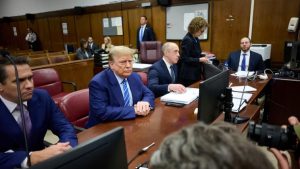United States President Donald Trump has declared a national emergency over the spread of coronavirus in the United States.
Trump describes “National Emergency” – as two very big words.
— Sherwin Bryce-Pease (@sherwiebp) March 13, 2020
The declaration will free up some 50 billion US dollars in disaster relief to assist states and local municipalities fight the pandemic which has infected over 1800 people in the country and claimed more than 40 lives.
The President has invoked the Stafford Act which allows the Federal Emergency Management Agency known as FEMA to coordinate the national emergency response.
After more than 30 states had already declared national emergencies, President Trump’s decision unleashed the full might on the federal government in fighting the spread of the virus.
“I am officially declaring a national emergency. Two very big words. The action I am taking will open up access to up to 50 billion dollars of. Very importantly, very important. And a large amount of money for states and territories and localities in our shared fight against this disease in furtherance of the order emerging every state to set up emergency operation centers effective immediately.”
To unleash the full power of the Federal Government in this effort, today I am officially declaring a National Emergency. pic.twitter.com/yu2GBcxWD6
— Donald J. Trump (@realDonaldTrump) March 13, 2020
Trump added: “Using federal emergency authorities, the FDA approved a new test for the virus. We did this within hours after receiving the application from Roche, a process that would normally take weeks. We therefore expect up to a half a million additional tests will be available early next week. We’ll be announcing locations probably on Sunday night.”
All the major sporting codes have canceled games and or suspended seasons until further notice, Broadway in New York City decided to go dark for at least a month with schools closed in multiple jurisdictions, churches shutting their doors, panic buying in grocery stores as life in general fundamentally been disrupted for Americans across the country.
At the United Nations Headquarters, a majority of staff were told to stay home as a decision to possibly shut down the campus is still pending, as Spokesperson Stephane Dujarric explains.
“The direction we’re going into is to reduce as much as possible the footprint of people going into this building. That anyone who can work from home will be told to work from home. What is important and to remember is that the UN’s work will continue, we will continue to support peacekeeping operations, we will continue to support our humanitarian operations, our colleagues will continue to work on the budget. Things will be done from home, if member states decide like the Security Council decide that they need to hold meetings, we will support them in whatever way we can.”
As the global economy creaks under the wait of the one-two punch of the virus, concerns that the UN’s development agenda will begin to suffer financial consequences of its own.
“The SG and the meetings he’s had with senior staff has brought up over and over again the negative impact that this may have on the global economy and the knock-on effects on the investments that we need for the decade of action on SDGs, on investment in climate, on all the other long-term things that we’re looking for. One of the things that’s clearly coming out as countries fight this is the issue of inequality, who has access to healthcare, who will get treated first, the amount of investments that countries are able to put in and who has help. This is only making this fault lines of inequality come out much, much clear.”
The US Congress is also working on the passage of a relief package to assist Americans who are likely to suffer financially due to the impact of COVID-19.





